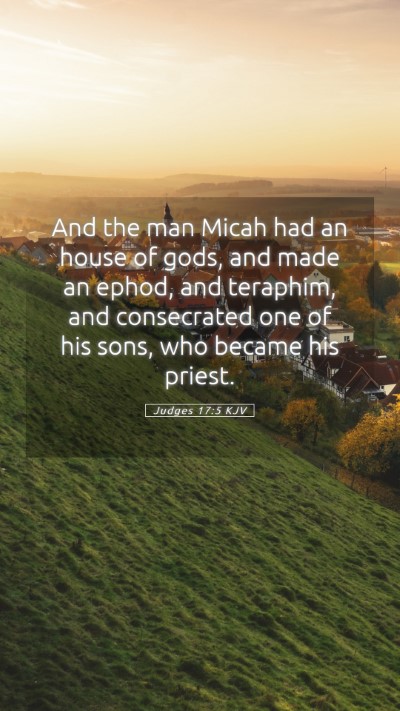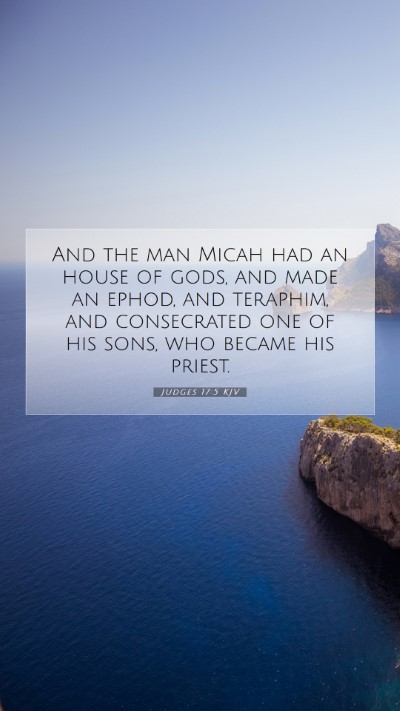Old Testament
Genesis Exodus Leviticus Numbers Deuteronomy Joshua Judges Ruth 1 Samuel 2 Samuel 1 Kings 2 Kings 1 Chronicles 2 Chronicles Ezra Nehemiah Esther Job Psalms Proverbs Ecclesiastes Song of Solomon Isaiah Jeremiah Lamentations Ezekiel Daniel Hosea Joel Amos Obadiah Jonah Micah Nahum Habakkuk Zephaniah Haggai Zechariah MalachiJudges 17:5 Meaning
What is the meaning of Judges 17:5?
And the man Micah had an house of gods, and made an ephod, and teraphim, and consecrated one of his sons, who became his priest.
Judges 17:5 Bible Verse Meaning
Understanding Judges 17:5
Bible Verse: Judges 17:5 - "And the man Micah had an house of gods, and made an ephod, and teraphim, and consecrated one of his sons, who became his priest."
Bible Verse Meanings and Interpretations
This verse presents intriguing elements about personal worship and the establishment of priestly roles outside the prescribed Levitical system. It illustrates a departure from the central worship instituted by God, suggesting a time of religious confusion and moral decline in Israel.
Key Themes in Judges 17:5
- Idolatry: The phrase "house of gods" indicates Micah's inclination towards idolatrous practices, deviating from the worship of the true God.
- Personal Worship: Micah’s construction of a personal shrine reflects the tendency of individuals to create their own forms of worship, often leading to spiritual compromise.
- Contrasts with Levitical Authority: The appointment of Micah's son as a priest signifies the replacement of divinely appointed priests with personal choices, undermining the established order.
Commentary Insights
Matthew Henry: Henry emphasizes that Micah's actions demonstrate a “bad state of religion” during the period of the Judges, where personal desires overshadowed divine command. The establishment of his personal priesthood indicates a moral decay and forsaking of God’s law.
Albert Barnes: Barnes suggests that Micah's household religion serves as a microcosm of Israel’s spiritual chaos. He expresses that the act of making an ephod and teraphim symbolizes the blending of true worship with pagan practices, leading to significant theological confusion.
Adam Clarke: Clarke annotates that the teraphim were household idols, which were common in ancient Near Eastern cultures. His observations highlight that Micah represented a trend of individualistic religion that lacked accountability to God’s appointed structure.
Application and Significance
This verse speaks to modern readers by cautioning against the establishment of personal religious practices that diverge from biblical teachings. It invites one to reflect on the importance of community in worship and adhering faithfully to God’s word.
Cross References
- Exodus 20:3-5 - The commandment against idolatry.
- 1 Samuel 13:9-14 - Saul's unauthorized religious act.
- Judges 18:1 - Further decline in Israel's worship.
Further Study and Reflection
This verse offers substantial material for bible study groups or online bible study sessions regarding the significance of rightful worship and the consequences of straying from divine directions. It serves as a reminder to examine our own practices in light of Biblical teachings.
Key Study Questions
- What does Judges 17:5 reveal about the spiritual state of Israel at the time?
- How can we ensure that our personal worship aligns with biblical principles?
- What lessons can we learn about the authority of established religious practices?
Conclusion
Judges 17:5 provides a focal point for discussing the themes of idolatry, personal worship, and authority within the context of faith. By understanding this scripture through the lenses of ancient cultural practices and God’s intentions, we can glean critical insights that apply to contemporary worship and spirituality.


